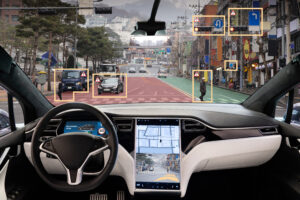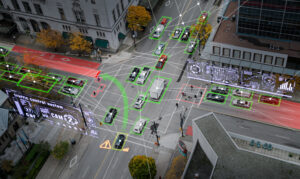Researchers at Birmingham City University (BCU) in the UK are using virtual reality (VR) technology to design autonomous vehicles (AVs) that prioritize the safety of deaf and hard of hearing pedestrians.
As AVs gain more traction in the UK, not all designs currently consider the needs of individuals with disabilities, which raises safety concerns.
“Drivers often communicate with pedestrians and cyclists using hand signals, head gestures and eye contact. However, with humans no longer in the driving seat, these traditional methods will be replaced by an external human-machine interface (eHMI),” said Dr Wenge Xu, an expert in human-computer interaction at BCU, highlighting the crucial role technology can play in addressing these challenges.
Dr Foroogh Hajiseyedjavadi, a lecturer in civil engineering at BCU, explained that this has produced a gap in eHMI development: “There are no fully operational highly automated vehicles with eHMI capabilities on the roads. Ongoing development efforts have produced prototypes, but it’s essential to integrate considerations for disabled people.”

In the UK, there are 11 million deaf and hard of hearing individuals, and 400 million worldwide, whose needs have been largely overlooked in current eHMI research and development. Xu emphasized the importance of inclusivity in the design phase to ensure accessibility for all users.
In a new project, BCU’s research team will be the first to employ VR and a user-centred design approach to simulate interactions between deaf and hard of hearing people and AVs.
“Current designs rely on audio cues and digital signs, which may not be accessible to deaf individuals or those whose first language is British Sign Language,” Xu explained.
“By involving deaf and hard of hearing people in the design process using VR, we can track their eye and body movements to understand their reactions in a realistic road setting.”

The project, funded by a £70,000 (US$89,000) grant from the Royal Society, will see Xu collaborate with major car manufacturers and charities to develop an inclusive interface suitable for everyone, potentially extending to other disabilities.
Professor Hanifa Shah, pro-vice-chancellor and executive dean of BCU’s faculty of computing, engineering and the built environment, supports the project. “At BCU, we believe in applying our expertise in advanced technologies to solve problems and improve lives,” she said. “This project exemplifies our ‘knowledge in action’ approach, and we look forward to creating safer streets for deaf people through this vital research.”


